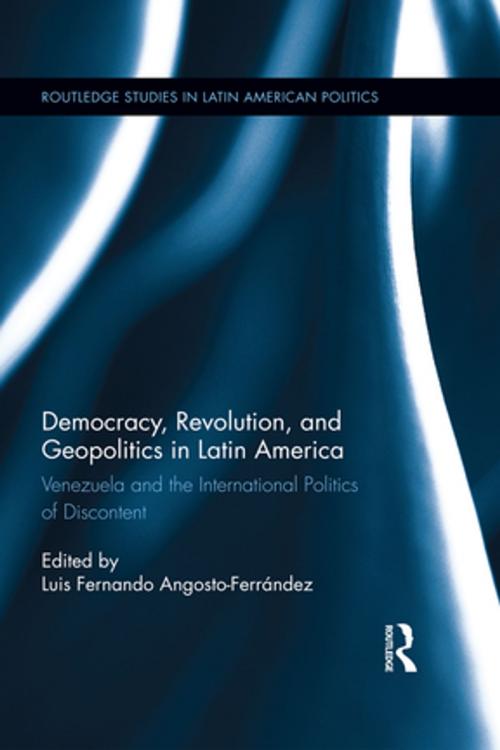Democracy, Revolution and Geopolitics in Latin America
Venezuela and the International Politics of Discontent
Nonfiction, Social & Cultural Studies, Political Science, International, International Relations, Social Science, Anthropology| Author: | ISBN: | 9781134503186 | |
| Publisher: | Taylor and Francis | Publication: | November 12, 2013 |
| Imprint: | Routledge | Language: | English |
| Author: | |
| ISBN: | 9781134503186 |
| Publisher: | Taylor and Francis |
| Publication: | November 12, 2013 |
| Imprint: | Routledge |
| Language: | English |
Hugo Chávez won re-election in the 2012 Venezuelan presidential election, despite a closer margin between candidates than in previous elections. The results were puzzling for those who believed that Chávez’s government had long ago reached its limits, while Chávez’s supporters were struck by the growth of the opposition vote. Thus understanding the Venezuelan election of 2012 has proved to be challenging, with various recent studies focused upon it. Luis F. Angosto Ferrández’s book advances two ideas not previously discussed: the relationship between electoral behavior in Venezuela and contemporary Latin American geopolitics, and the way that relationship is projected through the candidates’ appeal to narratives that situate Venezuela at the core of a heroic Latin American tradition and of a new regional process of integration.
This edited volume first contextualizes and explains the results of the last re-election of Hugo Chávez in terms of its geopolitical conditionings and implications. Contributors tackle Latin American geopolitics by analyzing Venezuelan foreign policy and the country's role in continental projects of supra-national integration. Contributors also examine electoral strategy and tactics in order to show how the two main candidates built their campaign on emotional grounds as much on rational ones. This will be connected to the investigation of new narratives of national identification in contemporary Venezuela and how they may have practical implications in the design of policies addressing issues such as indigenous rights, community media and national security.
Compiling state-of-the-art research on Latin American and Venezuelan politics, this book will appeal to academics and professionals who specialize in Latin American studies, international relations, democracy, and indigenous peoples.
Hugo Chávez won re-election in the 2012 Venezuelan presidential election, despite a closer margin between candidates than in previous elections. The results were puzzling for those who believed that Chávez’s government had long ago reached its limits, while Chávez’s supporters were struck by the growth of the opposition vote. Thus understanding the Venezuelan election of 2012 has proved to be challenging, with various recent studies focused upon it. Luis F. Angosto Ferrández’s book advances two ideas not previously discussed: the relationship between electoral behavior in Venezuela and contemporary Latin American geopolitics, and the way that relationship is projected through the candidates’ appeal to narratives that situate Venezuela at the core of a heroic Latin American tradition and of a new regional process of integration.
This edited volume first contextualizes and explains the results of the last re-election of Hugo Chávez in terms of its geopolitical conditionings and implications. Contributors tackle Latin American geopolitics by analyzing Venezuelan foreign policy and the country's role in continental projects of supra-national integration. Contributors also examine electoral strategy and tactics in order to show how the two main candidates built their campaign on emotional grounds as much on rational ones. This will be connected to the investigation of new narratives of national identification in contemporary Venezuela and how they may have practical implications in the design of policies addressing issues such as indigenous rights, community media and national security.
Compiling state-of-the-art research on Latin American and Venezuelan politics, this book will appeal to academics and professionals who specialize in Latin American studies, international relations, democracy, and indigenous peoples.















